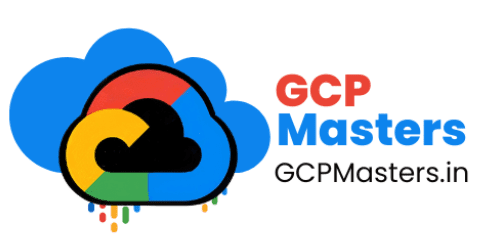Top GCP Roles and Responsibilities
In this article, we will cover everything you need to know about Google Cloud Platform (GCP). We’ll explain its main features and services, and we’ll also discuss the roles and responsibilities involved in using GCP. Our goal is to help you understand how to effectively work with GCP, whether you’re new to it or have some experience.
Contents
Top GCP Roles and Responsibilities
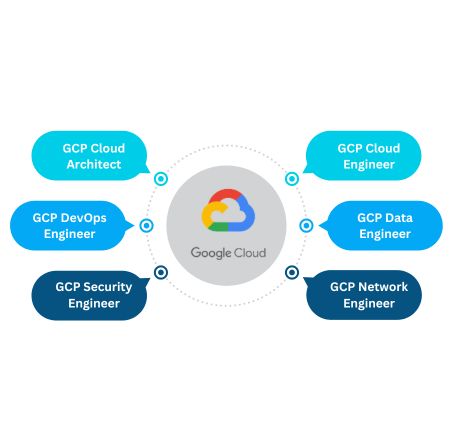
GCP Roles and Responsibilities are crucial as Google Cloud Platform (GCP) offers a variety of roles essential for managing and utilizing its services effectively.One of the key roles is the Cloud Architect, who designs the overall architecture of the cloud environment. This role involves creating solutions that are scalable, reliable, and secure. Cloud Architects work closely with development teams to ensure that applications are built in a way that leverages the full potential of GCP’s infrastructure. They also make strategic decisions about the technologies and services that should be used, balancing cost and performance.
Another important role is the Cloud Engineer, responsible for implementing and maintaining the cloud infrastructure. Cloud Engineers handle the day-to-day management of GCP resources, including virtual machines, storage, and networking. They ensure that the cloud environment is running smoothly, performing tasks such as monitoring performance, managing security configurations, and troubleshooting any issues that arise. Additionally, Cloud Engineers often automate routine tasks using scripts and configuration management tools to improve efficiency and consistency.
The DevOps Engineer role is also crucial in the GCP ecosystem. DevOps Engineers bridge the gap between development and operations by automating and optimizing the continuous integration and continuous delivery (CI/CD) pipelines. They use GCP tools to streamline the deployment process, ensuring that code changes are delivered quickly and reliably. This role involves a deep understanding of both software development and IT operations, enabling DevOps Engineers to improve collaboration and productivity across teams. By implementing best practices in automation and monitoring, they help maintain a stable and responsive cloud environment.
What is GCP?
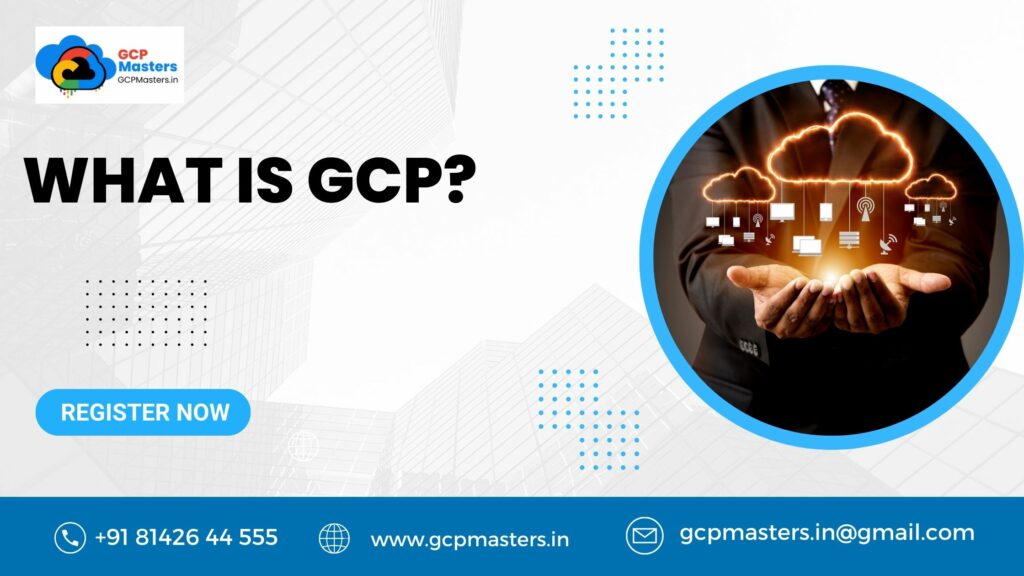
Google Cloud Platform (GCP) is a suite of cloud computing services offered by Google. It provides a range of services for computing, storage, data analytics, machine learning, and more, allowing businesses to build and run applications on Google’s infrastructure. GCP offers scalable and reliable services that help companies manage their IT needs without the need for physical hardware, making it easier to develop and deploy applications globally.
GCP includes services like Google Compute Engine for virtual machines, Google Cloud Storage for scalable storage solutions, and BigQuery for data analytics. These services are designed to be highly flexible and can be customized to meet the specific needs of different projects. GCP also emphasizes security, offering robust tools to protect data and ensure compliance with various regulations. By leveraging GCP, businesses can innovate faster, reduce costs, and improve their overall efficiency. Press Tab to write more…
What is GCP used for?
Google Cloud Platform (GCP) is used for various industries. It is a suite of cloud computing services offered by Google, providing a wide range of infrastructure and platform services for computing, storage, data analytics, machine learning, and more. GCP allows users to build, deploy, and scale applications on Google’s infrastructure. Some common use cases include
Compute Services
Compute Services: GCP provides virtual machines (Compute Engine) for running applications, containerized applications using Google Kubernetes Engine (GKE), and serverless computing through Cloud Functions
Storage and Databases
Organizations use GCP for scalable and durable storage using Google Cloud Storage. It also offers managed database services such as Cloud SQL for relational databases and Cloud Bigtable for NoSQL databases.
Big Data and Analytics
GCP is widely used for big data analytics, offering services like BigQuery for interactive SQL queries, Dataflow for stream and batch processing, and Dataprep for data preparation.
Machine Learning and AI
GCP provides tools and services for machine learning including an AI Platform for building and deploying machine learning models, and various pre-trained machine learning APIs for vision, speech, language, and more.
Networking
GCP offers networking services such as Virtual Private Cloud (VPC) for creating private, isolated networks, and Cloud Load Balancing for distributing traffic across instances.
Internet of Things (IoT)
Organizations leverage GCP to manage and analyze IoT data. Services like Cloud IoT Core help in securely connecting and managing IoT devices.
DevOps and Application Development
GCP supports DevOps practices with services like Cloud Build for continuous integration and continuous delivery (CI/CD) and provides tools and environments for application development.
Security and Identity
GCP includes security services such as Identity and Access Management (IAM) for controlling access to resources, Key Management Service (KMS) for managing cryptographic keys, and security features integrated into various services.
Content Delivery and Edge Computing
GCP provides services like Cloud CDN for content delivery and Cloud Run for deploying containerized applications at the edge.
Collaboration and Productivity
GCP integrates with Google Workspace (formerly G Suite), offering collaboration tools like Gmail, Google Drive, and Google Docs.
What skills are required for GCP?
Technical Skills
- Cloud Architecture Design: Understanding how to design scalable, secure, and efficient cloud architectures.
- Networking: Knowledge of networking concepts, including VPC, subnets, load balancing, and DNS within GCP.
- Compute Services: Familiarity with Google Compute Engine, Kubernetes Engine, and App Engine for deploying and managing applications.
- Storage Solutions: Expertise in Google Cloud Storage, Cloud SQL, Cloud Spanner, and Bigtable for managing data.
- Identity and Access Management (IAM): Skills in configuring IAM roles and policies to manage user permissions and security.
- Database Management: Experience with database services provided by GCP, including relational and NoSQL databases.
- Automation and Scripting: Proficiency in automation tools and scripting languages like Python, Terraform, and Cloud Deployment Manager.
- Containerization and Orchestration: Knowledge of Docker and Kubernetes for containerized applications.
- Big Data and Analytics: Understanding of BigQuery, Dataflow, and Dataproc for handling large datasets and performing data analysis.
- Machine Learning:Familiarity with AI and machine learning services like TensorFlow, AI Platform, and AutoML.
- DevOps and CI/CD: Skills in setting up and managing continuous integration and continuous delivery pipelines using GCP tools.
- Monitoring and Logging:Proficiency in using Stackdriver for monitoring, logging, and diagnosing application performance issues.
GOOGLE CLOUD PLATFORM Soft Skills
In addition to technical expertise, working effectively with Google Cloud Platform (GCP) also requires a strong set of soft skills. These skills help professionals collaborate better, manage projects efficiently, and adapt to the rapidly evolving cloud environment. Here are four key soft skills essential for GCP professionals:
- Strong Communication Skills: Professionals in Google Cloud must excel in clear and concise communication of complex technical concepts, fostering collaboration with colleagues, stakeholders, and clients. Strong communication skills enable effective conveyance of ideas, requirements, and solutions, ensuring shared understanding and alignment in Google Cloud projects.
- Decision-Making Skills: Acquiring GCP skills requires job decision -making capabilities. In any business context, a decisive candidate is crucial for this role. Proficient GCP Engineers need the ability to make well-founded decisions, especially in challenging situations. Quick decision-making empowers GCP skills holders for agile development and swift code changes.
- Adaptability: Adaptability is a crucial soft skill for professionals working with Google Cloud Platform (GCP) due to the dynamic nature of the cloud computing industry. The field is characterized by rapid technological advancements, frequent updates, and the continuous introduction of new services and tools. Therefore, professionals must be open to learning and quickly integrating these new developments into their workflows.
- Collaborating Skills: Collaboration is vital for the success of Google Cloud initiatives. GCP Professionals need to seamlessly collaborate within cross-functional teams, engaging with individuals from diverse backgrounds, disciplines, and levels of experience. Strong collaboration skills include active listening, respect for differing ideas, and constructive contributions during group discussions. By fostering a collaborative culture, Google Cloud experts facilitate effective teamwork, creativity, and the achievement of project objectives.
GCP Job Description
As the GCP Architect, your main role will revolve around constructing and supervising cloud systems, which includes servers, storage, and network infrastructure. You’ll play a pivotal role in collaborating with various IT teams throughout the organization, working hand in hand to elevate and refine our cloud infrastructure’s performance. This involves not only setting up the foundational elements of our cloud environment but also continuously improving and optimizing it to meet evolving business needs.
What are the Job Roles in GCP
In Google Cloud Platform (GCP),various job roles cater to different aspects of cloud computing. Here are some common job roles associated with GCP
- GCP Developer.
- Cloud Engineer
- GCP Architect
- GCP Data Engineer
- Data Scientist
- DevOps Engineer
- Security Engineer
- Machine Learning Engineer
- Cloud Consultant
- Site Reliability Engineer (SRE)
- Business Analyst
GCP Roles and Permissions Include
In Google Cloud Platform (GCP), there are three main types of roles and permissions
1. Primitive roles:
These include Owner, Editor, and Viewer. Owners have full control over resources, Editors can make changes but can’t manage access, while Viewers can only see resources.
2. Predefined roles:
These roles grant access to specific GCP services. For example, there are roles like Compute Engine Admin or Storage Object Viewer, which provide access to compute or storage services, respectively.
3. Custom roles:
These roles are tailored to the specific needs of the organization. Users can define a set of permissions based on their requirements, combining actions from various predefined roles or creating entirely new ones to grant precise access control.
GCP Admin Roles and Responsibilities
Google Cloud Platform (GCP) admin roles involve a range of responsibilities critical to maintaining the stability, security, and efficiency of cloud environments. Administrators are tasked with overseeing the configuration, deployment, and management of GCP resources, ensuring they align with organizational objectives and best practices. This involves setting up user accounts, defining access controls, and managing permissions to safeguard sensitive data and prevent unauthorized access. GCP admins are also responsible for monitoring resource usage, optimizing costs, and implementing scalability measures to ensure resources are allocated effectively and in line with budgetary constraints.
Moreover, GCP admins play an important role in implementing and maintaining security measures across the cloud infrastructure. This includes configuring firewalls, encryption, and identity management solutions to protect against potential threats and vulnerabilities. Admins must stay ahead of the latest security updates and industry best practices to proactively mitigate risks and ensure compliance with regulatory requirements. Additionally, they collaborate closely with other IT teams to troubleshoot issues, provide technical support, and implement solutions that enhance the overall performance and reliability of GCP services.
GCP Job Description
| Infrastructure Design and Implementation |
|
| System Administration |
|
| Automation and Scripting |
|
| Performance Optimization |
|
| Security and Compliance |
|
GCP Qualifications
- Bachelor’s degree in Computer Science, Information Technology, or related field.
- Proven experience as a GCP Administrator or similar role.
- In-depth knowledge of GCP services and features.
- Strong scripting and automation skills (e.g., Python, Bash).
- Experience with Infrastructure as Code tools (e.g., Terraform, Ansible).
- Solid understanding of networking principles and cloud security best practices.
- Relevant Certifications such as Google Cloud Certified Professional Cloud Architect or similar
- Excellent problem-solving and communication skills.
GCP Admin Roles and Responsibilities
The role of a Google Cloud Platform (GCP) administrator revolves around the effective management and upkeep of an organization’s GCP infrastructure. This entails the establishment and configuration of cloud-based resources, ongoing monitoring, issue resolution, access and security management, and the continual optimization of performance.
Collaborating with various teams and stakeholders is a key aspect of a GCP administrator’s duties, ensuring alignment with the organization’s requirements. The GCP administrator takes charge of tasks such as the setup and maintenance of networks, implementation of security measures, and management of access controls. Additionally, they play a crucial role in identifying and resolving issues associated with the GCP infrastructure. Collaboration with development teams is essential, involving the integration of GCP services with existing systems and applications. Furthermore, GCP administrators ensure that the GCP infrastructure is configured in adherence to compliance and regulatory standards.

Project Administrator
Create and manage GCP projects. Set project-level permissions and controls. Allocate resources efficiently across projects. Monitor and manage project billing.
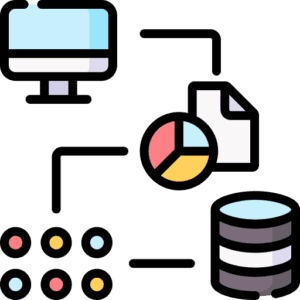
IAM (Identity and Access Management) Administrator
Define and manage roles and permissions. Assign roles to users, groups, and service accounts. Ensure proper access controls and least privilege principles. Audit and review access policies regularly.
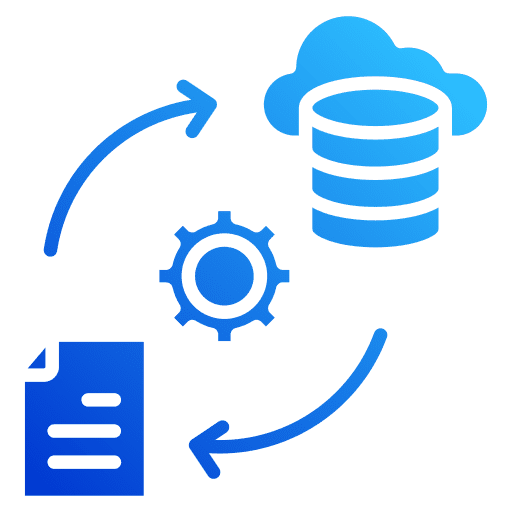
Compute Engine Admin
Provision and manage virtual machines on Google Compute Engine. Configure networking and security settings for instances. Monitor and optimize VM performance. Implement scaling strategies as needed.

Storage Administrator
Manage and configure Google Cloud Storage resources. Define access controls and policies for storage buckets. Optimize storage solutions for performance and cost. Implement backup and data retention strategies.

Network Administrator
Design and implement GCP networking solutions. Configure and manage Virtual Private Clouds (VPCs). Set up and maintain VPNs and interconnects. Implement network security controls.
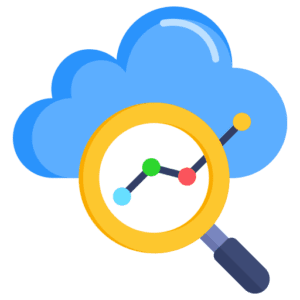
Database Administrator (DBA)
Administer and optimize Google Cloud databases (e.g., Cloud SQL , Firestore, Bigtable). Design and implement database backup and recovery strategies. Ensure data integrity and security. Monitor and troubleshoot database performance.

Security Administrator
Implement and enforce GCP security best practices. Monitor and respond to security incidents. Configure and manage security policies and controls. Conduct regular security audits and assessments.

Monitoring and Logging Administrator
Set up and configure monitoring and logging tools (e.g., Stackdriver). Monitor system performance and resource utilization. Create and manage alerts for critical events.

Deployment Manager
Automate infrastructure deployment and configuration. Define and manage templates for resource provisioning. Implement version control for infrastructure as code. Ensure consistent and repeatable deployments.

Compliance and Governance Specialist
Set up and configure monitoring and logging tools (e.g., Stackdriver). Monitor system performance and resource utilization. Create and manage alerts for critical events.
GCP Admin Salary
- Google Cloud Platform (GCP) administrators play a crucial role in managing and maintaining the infrastructure and services on the Google Cloud platform. As businesses increasingly adopt cloud technologies, the demand for skilled GCP administrators has risen, leading to competitive salaries in the field.
- In India, the salary of a GCP administrator can vary based on factors such as experience, location, industry, and the size of the organization. the average GCP administrator salary in India ranges from INR 6 lakhs to INR 15 lakhs per annum.
- Hyderabad, being a major IT hub in India, hosts numerous companies that leverage Google Cloud Platform for their operations. This high demand for cloud expertise often translates into more competitive salaries for GCP administrators in the region. The average GCP administrator salary in Hyderabad ranges from INR 7 lakhs to INR 16 lakhs per annum.
- Professionals with in-depth knowledge of GCP services, coupled with relevant certifications, can command salaries on the higher end of the scale.
Conclusion
In 2024, the growing reliance on cloud computing has made learning Google Cloud Platform (GCP) an immensely valuable skill with significant potential for career advancement. As businesses increasingly migrate their operations to the cloud, the demand for professionals proficient in GCP has surged across various industries. GCP offers a comprehensive suite of services and tools that empower organizations to innovate, scale, and optimize their operations, making it a vital asset for individuals seeking to stay relevant in the ever-evolving tech landscape.
Moreover, mastering GCP opens doors to diverse career opportunities, ranging from cloud architecture and system administration to data analytics and machine learning. With its emphasis on scalability, security, and flexibility, GCP equips professionals with the capabilities to tackle complex challenges and drive business growth. Therefore, investing in learning GCP in 2024 not only expands one’s skill set but also positions them at the forefront of technological innovation, ensuring they remain competitive and sought after in the job market.
FAQ'S
Learning Google Cloud skills provides various benefits, such as:
- Expanding career opportunities in cloud computing.
- Improving proficiency in cloud architecture and data analytics.
- Increasing marketability and demand in the IT industry.
- Equipping you to design and manage scalable and secure cloud solutions.
- Enhancing earning potential and job prospects.
The seven advantages of GCP include:
- Scalability
- Reliability
- Security
- Cost-effectiveness
- Innovation
- Global Reach
- Integration
GCP surpasses AWS for the following reasons:
- Competitive pricing
- Emphasis on innovation
- Powerful data analytics
- Robust machine learning services
- High-performance networking
- Native support for Kubernetes
- Excellent customer support
In a resume, GCP stands for Google Cloud Platform. Being a GCP expert is similar to having a well-designed resume that is strong, versatile, and able to tackle various tasks effectively. Your resume, as a GCP expert, should showcase strength, adaptability, and the capability to efficiently solve complex problems.
Indeed, GCP certification holds significant value for professionals. It not only validates your Google Cloud skills but also boosts your career prospects, providing a competitive advantage in the job market. Widely recognized by employers globally, it showcases your dedication to professional development. GCP certification aids in mastering the Google Cloud Platform, enriching your comprehension of cloud computing. Moreover, it opens doors to networking opportunities and exclusive resources, contributing to the enhancement of your professional journey.
